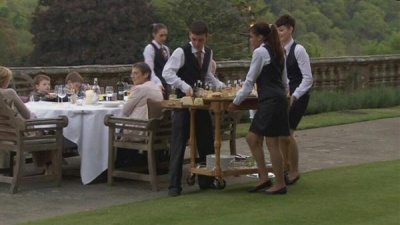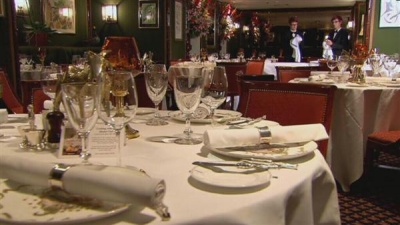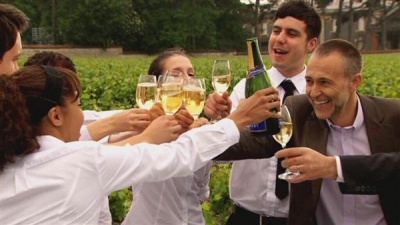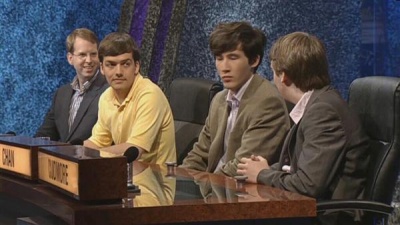Weaver's Week 2011-01-30
Last week | Weaver's Week Index | Next week
Later, we'll be discussing this week's epic University Challenge, and a Mastermind that will be remembered. First, we put ourselves at your service.
Contents |
Michel Roux's Service
Ricochet / Million Media for BBC2, 12 January – 2 February
(This review also discusses the non-game show Mary Portas: Secret Shopper, Optomen Television for Channel 4, from 19 January)
Suddenly, it seems that everyone is an expert on service. Mary Portas has built her career on what she defines as "good service", and now Michel Roux off of Masterchef Goes Large is going to expound his views of "good service" on BBC2. The vehicle for his opinions is a contest, in which he'll take eight young people, give them a crash course in his theories, and after a month he'll pay for two of them to take a professional qualification.
But let's take a step back, and consider the assumptions made by Portas and Roux. Both of them have ideas of what good service is, and assume that their viewers will all recognise it when we see it. Now, it's fair to say that most viewers will know bad service when they've experienced it – the person at the shop counter chewing gum and growling "yeah?" as though it was suddenly a criminal offence to actually want to pay for something. Or the waiter who bangs down a plate so hard that the table vibrates and drinks are spilled.
Viewers will know truly bad service when they see it. Mercifully, these examples are rare – so rare that we've had to make them up. But will viewers know good service when they see it? Perhaps they will, perhaps they won't. Perhaps what the viewer believes to be good service is what the expert believes to be bad service, and vice versa.
On BBC2, Michel Roux is refreshing in his honesty, he's only concerned with service as it applies to restaurants – the table waiters, the wine waiters, the maitre d'hote, the bar steward. Already, this column finds itself raising hackles, because what Mr. Roux is selling to his young charges isn't so much service as the etiquette expected by the moneyed classes of their hired servants. Not every restaurant can afford to have wine waiters, bar staff, greeters at the door. Many of the best ones combine all of these roles with the table waiter, and people come back because they serve high-quality food. So what if the waiter took a couple of minutes too long to top up with water, the guest will remember an outstanding meal for longer.
After a couple of episodes, we're less clear as to the aim of Mary Portas's series. She's been concentrating on shops, and seems to be advocating a more aggressive style, one where the customer isn't going to be allowed to browse, or to go in and know what it is they want. No, she seems to want to persuade people to spend more money than they thought they might. Is that service, or is that the dark arts of sales? We're entirely unsure. We are sure that the approaches adopted by Portas and Roux are not terribly compatible; he's very much more reserved, giving the customer room to breathe and to enjoy their experience on their own terms.
We're also sure that there's something about Michel Roux's programme that gets under our skin, something that we don't like and actually spoils our experience. After a couple of episodes, we found it. Everything he does, everywhere he goes, every challenge and location, is built on huge amounts of money. The restaurant on top of the Oxo Tower. The other restaurant with a garden on its roof. The five-star country mansion where guests expect to have their every whim indulged. The whole programme drips opulence from every frame.
Let's be fair: this column has no tremendous objection to rich people spending their money. We might ask questions about how they get their money, for instance if they're employed by banks, but that's another debate for another time. Nor do we have objections about television programmes about how rich people spend their money.
Where we do feel slightly deceived is in the fact that Service is billed as a programme about – well, service. A class in how to waiter, how to organise a restaurant. Not a demonstration of how the other 1% live, and how normal people will behave when dropped, like fish out of water, into this alien environment. We sympathise with the contender who recoiled away from the idea of waiting hand-and-foot at the country house retreat. That was our reaction.
The whole structure of some episodes had some overtones we were very uncomfortable with, it felt at times as though the contenders were being initiated into a secret society. They were trained in certain rituals that had no intrinsic meaning, but their masters would know of any error, and this would cause grave offence. The whole programme felt like it was pandering to the received prejudices and expected norms of the vastly wealthy, for if they were offended they will stop spending.
Perhaps the fundamental flaw of Service was that it felt like it was the same show every single time. Students arrive at a swanky restaurant. They're given a couple of days to familiarise themselves with the place, before actually doing the work themselves. The locations and the training changed, but the overall feel and pace did not.
However, Service wasn't all doom and gloom. If we could overlook the social subtext and the repetitive nature, we found that Michel Roux was the right kind of inspiration for his charges. He built their confidence by being honest and by being nice. Unlike some other television business people we could mention, he doesn't go around shouting at anyone who doesn't meet his high standards, he just has a quiet word in their ear, and explains why he's disappointed.
The format of Service lends itself to an elimination every episode. It's a refreshing change to find that, actually, this doesn't happen. The same cast who start at the beginning of show one can progress to the end of the series – that's unless anyone decides to leave of their own volition, or it becomes entirely clear that Michel Roux has lost confidence in them. We welcome this idea, it demonstrates that not every show has to have a musical chairs policy.
In the final analysis, Service is a comfortable reality show, rather than a challenging one. The title star lives up to his billing, though never quite takes centre stage in his own show. We found it to be a little predictable, which is not a bad thing for all viewers.
University Challenge
Deci-final 3: Sheffield v Magdalen Oxford
Sheffield had an easy win over Newcastle in the first round, and a close squeaker over UCL. Magdalen also stormed through their first round match, against Durham, before stumbling past Downing Cambridge in the second phase. Two final-year students from Magdalen, who proudly say they're "awaiting their results" in a way no-one else has done.
We begin with E of the week, the word "magic" as a prefix. Why do people gush over Proust, asked Greer, but that gets Magdalen off the mark. Will all of Sheffield's correct starters be five-letter words, as "prism" gives them the honour? The first visual round is upon us, and Joan Sutherland destroys our theory. Other members of the Order of Merit (or at least they were when this was filmed, Sutherland having died last year) mean Sheffield leads 60-40, and all five bonus sets have had exactly two questions answered correctly.
That bizarre record falls with the next set of bonuses, when the Sheffield team prove unable to remember the influential Manchester club the Hacienda, confusing it with the Militant Tendency. That was Liverpool, wasn't it? The coincidental Mastermind crossover question is on Skara Brae, part of prehistoric Orkney as discussed by Smallhead last week. The teams don't remember it, but does anyone still use DHTML? Quite possibly, it begat Javascript, which in turn begat AJAX, itself defeated by FC Twente home and away.
Orpheus in the Underworld introduces an audio round by German composers of the Romantic era, after which Sheffield has opened up a fair lead, 120-55. Thumper's a bit lenient to accept "That.. is... Breton Woods" pass from a contestant who is clearly thinking after he's buzzed. Having trailed by 85 points just before the audio round, Magdalen pull within 15, only for Sheffield to get a question about astronomy. When they're asked for a planet, and they don't know which, the only thing for a quiz contestant to do is answer "Uranus".
Wordplay of the week is giving definitions of words that are anagrams of chemical elements. It's not sufficient to have a wide vocabulary, but also to know that "tin" is an anagram of "nit". That brings the scores level at 135-135, but Sheffield move ahead again. There's a round asking in which London borough various attractions (and Heathrow airport) can be found; none of this week's contestants comes from the capital. The second visual round is on the Arabian Nights, and gives Magdalen the lead for the first time in a long time, 160-145.
When did various people receive the Nobel peace prize? Where's the Little Billy – ah, there. Magdalen don't have the courage of their own conclusions – after working out that "cycloid" is a path described by a rolling circle, they can't work out that a heart-shaped one would be a cardiod. Sheffield get a set of bonuses on words including the Irish diminutive "een". For instance, the most unpopular person in the room, the Briancoween. (This was the height of topical humour when we wrote it on Monday, it's now about as contemporary as the band Motorhead.) Sheffield have a 45 point gap to overcome, and in very little time, they've turned it into a 10-point lead with two-and-a-quarter minutes to play.
Magdalen pick up a starter to draw level, and are asked about deserts around the world, giving them a ten point lead. Who was the US president when Eden was PM? Not JFK but Eisenhower, that allows Sheffield to take a ten point lead with one minute to go. "Mono" lets Magdalen draw level, and they seem to run down the clock in taking a ten point lead. It's all on this question, about the name of a poet and his wife. Magdalen can take it with a name, but their interrupted answer is wrong. Sheffield buzz in, supply the correct answer, and they have won! Sheffield have won!
The final score is 230-225, and Sheffield won it on the buzzers – five starters and no missignals for Hugh Bennett, the side made 19/39 bonuses and had one incorrect interruption. Kyle Haddad-Fonda's six starters for Magdalen helped the Oxford side answer 23/36 bonuses correctly, two missignals counted against them.
Next match: Queen's Cambridge v Bristol
Mastermind
Heat 20
Targets for this week: 1) Win the game. 2) If not, finish second with a score better than 30 points (2 passes) to beat Hamish Cameron to the semi-final. 3) If not, second ahead of 27 (2) to make the repechage board.
Martin Short is first into the chair tonight, he's taking the Witches of Pendle (1612). Thirteen people were charged with selling their souls to the devil, and killing up to seventeen people in and around the Forest of Pendle by magic means. The proceedings were documented by the clerk of the court, and turned into a book. It was an era when the Anglican faithful saw enemies threatening their very existence, and subverted the law to make examples of anyone who stood out from the norm. Thank goodness nothing like that could happen today. The contender takes some long pauses in his round, and makes 8 (2).
Matthew Cheadle will discuss the England Football Team in the World Cup (est 1991). As our host will note later on, this should be a fairly slim round, as the team has qualified precisely twice. It lost in the quarter-finals to Germany in 1995, and to the United States at the same stage in 2007. The team has also qualified for the tournament in Germany this summer. The round has very little about these achievements, preferring to concentrate on the obscure and under-reported men's game, about which we know nothing. A bit like their knowledge of the offside rule. Anyway, it's a round of one half, in a neat 11 (0) formation.
Peter Cookson is next up, with the life and music of Gary Numan (b 1958). A member of the Tubeway Army, Numan discovered a synthesiser someone left behind in the studio, and fashioned a bleak electronic soundscape all of his own, incorporating a wide array of literary and cultural references. His fans are extremely loyal, sticking with him through a period of no commercial success between the mid-80s and mid-00s, though we don't think they've grown in number since the early 1980s. A bit like the round, sadly, which finishes on 6 (5).
Our final contestant is Glenn Entwistle, who has been studying Operation Barbarossa (1941). Flushed with his success in conquering most of Western Europe, Adolf Hitler set the Nazis one final challenge, to conquer the USSR. He believed the Red Army would be useless against his military machine, fresh from its great (er) draw against Britain. German forces conquered Minsk and Kyiv easily, and pushed on to Leningrad and the outskirts of Moscow. Progress ground to a halt, as the forces had not planned for the prospect of winter – they'd gone out with their summer clothes and hadn't topped up the antifreeze in their tanks. Leningrad would remain beseiged into 1944, but the failure was assured by the end of 1941. No such assurance here, the round ends on 9 (2).
Peter Cookson doesn't find the going much easier in his general knowledge round, advancing to 13 (10). Martin Short's second phase also starts strongly, but with a few good guesses – the many recent failures of Australia's cricketers, the revolution in Romania, the Sermon on the Mount, the modern pieces of eight – take him up to 20 (3). In what's looking like a low-scoring week, that might yet be enough.
Glenn Entwistle starts off with the Bodelian library, then remembers Celtic FC's European victory in 1967. Not just one match, but a whole competition. He also gets Laurence Olivier, but it's slow progress, with more passes and pauses and wrong answers than can ever prove successful. Still, 15 (6) is not to be sniffed at, it's fifteen more points than this column has ever achieved.
Matthew Cheadle begins his second phase with Tutankhamun's tomb, then has Monet and ... well, another round of good but inaccurate guesses. Very few passes, but it takes forever to tick the scoreboard over, and by the time it does, the show's all but over. The final score is 15 (4).
So Martin Short, a truck driver from Lancashire, joins Hamish Cameron in the second round, which starts in early March.
This Week And Next
The National Television Awards were presented this week. In this contest of the most popular programmes and entertainers as judged by the populist ITV and by a populist newspaper, it's no tremendous surprise to find that Ant and Dec are still the most popular entertainment presenters on British television. They first won this particular award in 2001, for their work on SM:TV Live, and haven't lost it since. The winners will be back with a new series of Push the Button on 12 February.
Ratings for the week to 16 January show Dancing on Ice is still Britain's most popular game show, 8.85m people saw the latest moves. In It to Win It had 6.25m watching, and 5.6m saw The Magicians. The Biggest Loser returned to an audience of 3.95m. University Challenge was BBC2's biggest game show, with 2.9m viewers; Michel Roux's Service had 1.9m for its opening episode. Channel 4's top competition was the Saturday repeat of Come Dine With Me, 2.5m there.
Got to Dance continued to lead the digital channels, 1.25m saw the twinkletoes. Come Dine With Me had 605,000 for its Sunday night outing on More4, barely ahead of Hell's Kitchen Us (565,000 on ITV2) and Only Connect (560,000 on BBC4). E4's Tool Academy debuted with 520,000 viewers, barely a fifth of the audience for Glee moments earlier. At the other end of the scale, ESPN Classic is making its bid for Most Slightly Seen Show of the Year, recording 7000 viewers for a midnight repeat of The Sporting Superstars.
For viewers across the UK, this week brings Cookery School (C4, 2.05 weekdays), and we can't possibly guess what's going on there. A Farmer's Life for Me (BBC2, 7pm Tuesday) is competitive farming for couples. There's a new imported run of The Apprentice (BBC1, 12.20am Tuesday). Listeners in Scotland have Young Traditional Musician of the Year (Radio Scotland, 5pm Sunday), and viewers in Ireland might enjoy Feis and Blood (TG4, 7.15 Sunday) with some talented families. Next Saturday night is Bob Monkhouse night on BBC2, there's another chance to see the BAFTA tribute at 6pm, and the Secret Life programme about his videotape collection gets played at 7.30.
To have Weaver's Week emailed to you on publication day, receive our exclusive TV roundup of the game shows in the week ahead, and chat to other ukgameshows.com readers, sign up to our Yahoo! Group.






